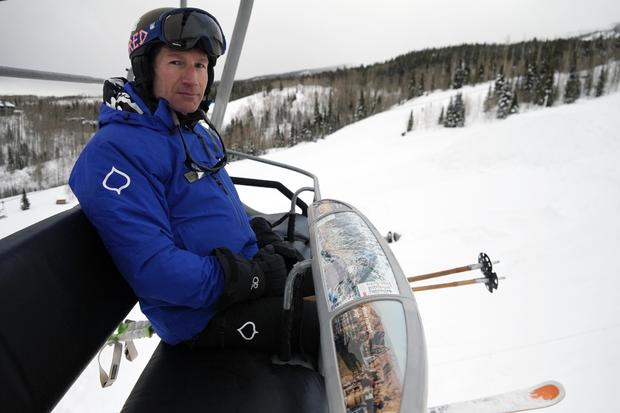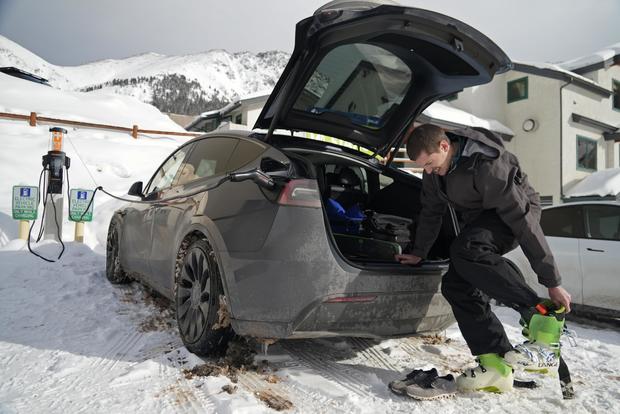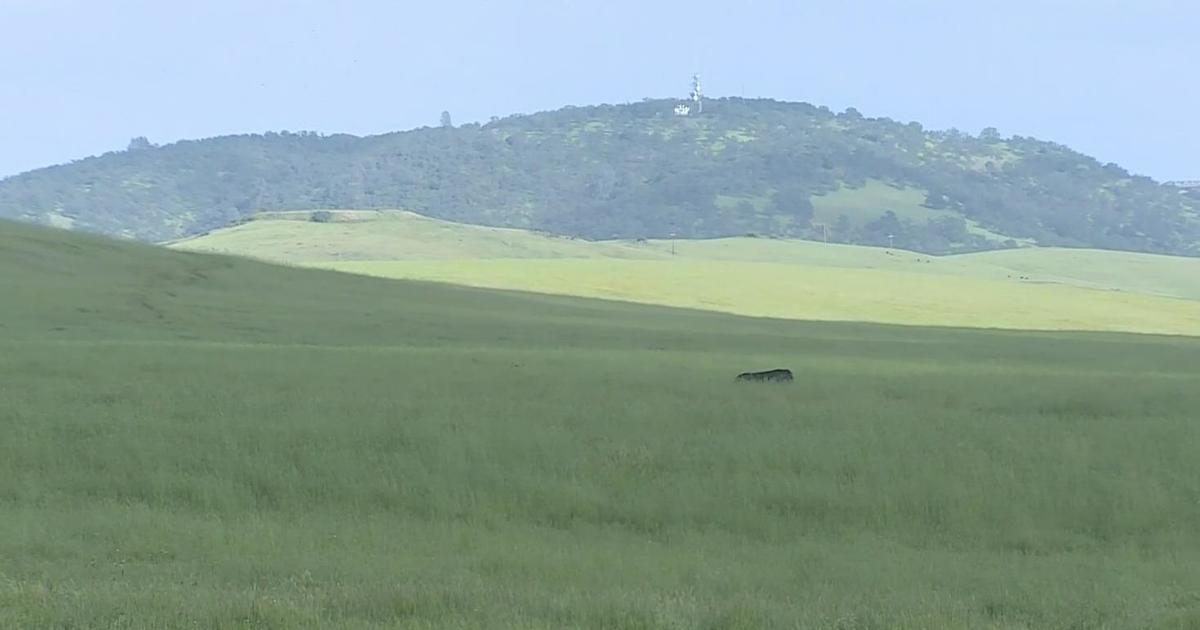Ski resorts are embracing a new role: climate activist
Snow falls thick as skiers shed their gear and duck into the Sundeck Restaurant, one of the first certified energy efficient buildings in the U.S. — this one at 11,200 feet above sea level atop Aspen Mountain in Colorado.
WeatherNation plays on the television, looping footage of last year's megastorms and flashing a headline: "2022 billion dollar disasters."
Aspen Skiing Company's vice-president of sustainability, Auden Schendler, who watches skiers as they walk in, says it's not enough for resorts to just change their on-site operations to become "green." They must also advocate for policies that combat climate change.
As global warming threatens to put much of the ski industry out of business over the next several decades, resorts are beginning to embrace a role as climate activists in the halls of government.
The industry contributes just a tiny fraction of overall greenhouse gas emissions, which cause climate change, but arguably has outsized influence on popular culture and in the business world.
While many resorts are focused on reducing their own emissions, others are going much further, leveraging their influence to shift public opinion and advocate for climate legislation.
RELATED: See the immersive story
Arapahoe Basin is a U.S. ski area that built a name as a sustainability leader for years before advocating for climate policies. Positioned high up on the craggy, wind-whipped continental divide in central Colorado, the mountain is relatively well-positioned to endure a warmer, shorter winter season. High altitude, which keeps temperatures cooler and lengthens the time snow stays on the ground, is its golden ticket. But it isn't immune to extreme weather: It has experienced close calls with wildfires and subsequent mudslides, which washed out a parking lot adjacent to its slopes in 2021.
About a decade ago, the ski area transitioned from spending thousands of dollars annually to cancel out some carbon emissions by paying for carbon credits to instead funding a staff position focused on reducing on-site emissions.
One way they're working to nudge a transition to renewable energies is with newly installed electric vehicle chargers. After a day on the slopes, Denver resident Kurt Zanca returned to his Tesla, which had been charging for free at one of the five dual-port stations situated in the front row of the mountain's parking lot.
Many skiers around the world, most recently in Europe, are already seeing the impacts of climate change.
Ski seasons are often shortened compared to previous years and resorts are increasingly depending on manufactured snow.
Arapahoe Basin, affectionately known by locals as "A-bay," is working toward net-zero emissions by 2025, partially by relying on credits through the Colorado Carbon Fund to offset some natural gas and diesel they'll still be burning at that time. They also aim to divert 75% of their waste by then - they're currently at 50% through various recycling and composting programs.
Sustainability Manager Mike Nathan says these efforts give them clout when trying to flex their influence off the mountain. They've pressured their utility, Xcel Energy, to expedite the transition to renewable power. Recently, Nathan and other industry leaders met with the governor's staff to encourage the rapid transition to manufacturing EV heavy machinery statewide. And, after watching a federal bill that eventually became the Inflation Reduction Act stall, Nathan and Chief Operating Officer Alan Henceroth co-authored an op-ed and sent letters to Colorado's congressional delegation.
"Kicking the can for another legislative session was going to have direct and negative impacts on businesses like us," Nathan said.
Customer travel remains a primary source of pollution for ski areas, with air travel, in particular private jets, a major culprit. For example, over 80 percent of flights in and out of Aspen-Pitkin County Airport are private jets, airport officials said.
Ideally, airports could tax private jets and invest that money in renewable energy projects, said Schendler. But the Federal Aviation Administration remains a roadblock. Federal law prohibits airports from spending tax revenue off-site. This restricts any renewable projects to airport grounds, and any revenue made from them must be used exclusively at the facility.
While Aspen has yet to win over the FAA, it found a way to sway its local utility, Holy Cross, which supplies power to more than a dozen towns in addition to Vail Mountain Resort along the Interstate 70 corridor. About 15 years ago, Schendler began phoning environmentally minded locals and encouraged them to run for board positions for the utility, which produced about 10% renewable electricity at the time. Today, the board is stacked with pro-renewable members, largely the fruit of lobbying by Aspen and other activists. The utility is split about 50/50 between renewables and fossil fuels, and is committed to 100% renewables by 2030.
Another way to speed the transition to renewables is through power purchase agreements. This is when a business or utility commits to buying a set amount of energy from yet-to-be-built projects, guaranteeing some of the funding to be built.
Snowshoe Mountain is a ski resort in West Virginia still largely powered by fossil fuels. As the climate bill stalled last summer in Congress, CEO Patti Duncan felt the need to get involved. She doesn't consider herself an activist but wanted to speak up when she watched one of her state's senators, Joe Manchin, defend the state's coal industry and hold up the legislation. Duncan wondered, what about the thriving outdoor industry, which is negatively impacted by the burning of fossil fuels?
With encouragement by owner Alterra Mountain Company and climate activist group Protect Our Winters, she wrote a letter to Manchin. Days later, he came out in support of the bill. Patti said she doesn't know whether her letter played a role in the senator's decision but is glad she spoke up.
"It's my responsibility to do something about it for our resort and our community and our state," Duncan said.
On the other side of the country, Aspen had installed a kiosk at its Limelight Hotel lobby at the base of Snowmass Mountain. The kiosk allowed guests to send a prepaid card to the senator, encouraging him to support the bill.
The climate bill passed and was signed into law. As a result, record federal funding is now available for households and businesses to decarbonize buildings and transportation.
Many skiers applaud such efforts and want their favorite ski areas to have a role in fighting climate change. However, they want the efforts to be real and not just for show.
"As long as they're being sincere and not just sort of doing it for show and not actually making much of a change," said Archie Bolgar, a British student on vacation at Aspen in January with friends from Boston's Bentley University.
While there are many environmental issues corporations could embrace, Schendler, from Aspen Mountain, says the focus must be on reducing emissions to make sure global temperatures don't rise more than 2.7 degrees Fahrenheit compared to preindustrial times. The rise is currently about 2 degrees Fahrenheit, and climate scientists warn that as it increases so too will extreme weather events.
"If we can stabilize warming at sub 2 degrees Celsius, we're going to prevent billions of people from suffering. That's profound," he said.
By BRITTANY PETERSON Associated Press







